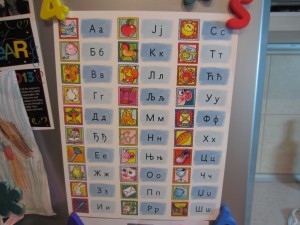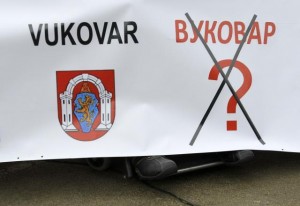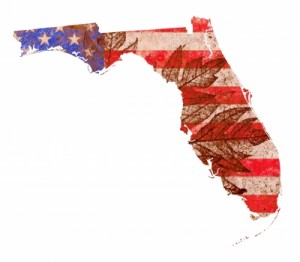The Cyrillic Alphabet as Political Act
So Laura, seriously. Why didn’t you start learning Cyrillic sooner?
Zing!
I should have bitten the bullet and taken a Serbian language class at a university as soon as we arrived in mid-2010. I should have committed to driving 30 minutes to one-hour each way (thanks to cluster-fuck bridge-construction traffic into Belgrade), rushing home to feed my infant, while playing with my toddler.
Hell, I should have even been able to get tons of studying done. What better moment than middle-of-the-night bottle feedings?
True, so true. Because the best time to tackle a new, very difficult language, is when one is sleep-deprived, culture shocked, and juggling two little kids.
I may have believed Cyrillic was “just a phase” …
The truth is, I resisted learning Cyrillic initially because I took the “dual-lettering” (words are often written in Cyrillic and Latin) in malls and stores to mean that Serbia was on its way to “European-ize” itself, as it attempts to join the E.U. [No, I'm not an idiot. It's just that the complexities of Balkan history and culture were fairly limited nonexistent in terms of American social studies education. And Western media, exemplified by the "All Serbs are war criminals" stereotype.
So anyway, Cyrillic as a phase? Um, not so much.
Reality check: Cyrillic is the alphabet of the Serbian language. While the West may lump ethnicities together, creating "Serbo-Croatian" dictionaries, locals will tell you that there is no such thing as a language called Serbo-Croatian. [I have nothing against Croatians, heck I was raised Catholic!]
Serbian is a language distinct from Croatian. (Let’s be real here, they’re very similar). Several words are different, and dialects and accents vary. But. The alphabet of Serbian is Cyrillic, and the alphabet of Croatian is Latin.
Rebel Serbs, really?
The difference in alphabet is not to be taken lightly.
In February, thousands of Croats rallied against a new law to display Cyrillic Signs in Vukovar, which is now a part of Croatia, but has a large ethnic Serb population. According to Reuters, Vukovar is “a town destroyed in the 1991-95 war with rebel Serbs.”
WARNING: I may be more nationalistic now than some Serbs. I may be a foreigner and truly have no beef against anyone because of their ethnicity, but I do have opinions … If you are 100% sure that the American media reporting of the break-up of Yugoslavia in the 1990s was balanced and unbiased, skip this section, please. I wouldn’t want to risk inadvertantly un-washing-someone’s brain.
Another quote from the Reuters article that exemplifies the Western perspective on the Balkan conflict
… the easternmost town of Vukovar, which many Croats still see as a symbol of destruction and suffering brought on by the Serb rebellion against Croatia’s independence from Yugoslavia. [boldface is mine.]
To clarify … the above referenced “rebel Serbs,” and the “Serb rebellion” … these were Yugoslav citizens. If they carried a passport, it was for Yugoslavia. People of Serb ethnicity were fighting to keep Croatia from gaining independence from Yugoslavia.
Stop! Caveat Time: Yes, the Serbs “lost,” yes, there was bad behavior on both sides. (This happens in war.) History is written by the victors, saying who’s a “rebel” versus who was “justified” and a “freedom fighter.”
Imagine for a moment …
Cuban-Americans [insert your mixed American ethnicity of choice] in Florida decided they were fed up (they, too have their reasons) and declare a free and independent Florida. … Would it be appropriate to call U.S. soldiers and citizens who take up arms against those seceding–rebels?
Would we call the ones who are fighting to keep Florida in the U.S., rebels?
Before anyone starts flaming me in the comments Consider this: during the Civil War, the Confederate Army was the Rebel Army, because they were the ones seceding.
Remember the American Revolutionary War? Yep. In that case, our constitutional Founders were Revolutionaries. Those who were remained loyal to the British throne (for whatever reason, surely they had at least one) … were “loyalists,” because they tried to keep the American colonies from gaining freedom.
The rebels were those who wanted to break away.
Cyrillic Alphabet as Political Act
Back to the Balkans …
What happened in Vukovar is that the Social Democratic-led Croatian government sought to implement a law (yes a law that passed by a democratic process). The law allows for Cyrillic public signs in places where there is at least a 1/3 Serb population. A significant number of Croatians (approx 20,000 rallied) have a problem with it.
The Croatian government is attempting to soothe ethnic tensions. … Protesting a law intended to recognize ethnic diversity, a law that your own democratic government carried out? That’s bad juju.
There you have it: Cyrillic is a political act. Ethnic tensions die hard.
Now please excuse me while this quote-un-quote rebel expat (and proud American citizen) takes some time to study her Cyrillic.
* * * * *
Vukovar protest image. Florida image from freedigitalphotos.net







That's an excellent point you raised. It truly is a question of perspective, a matter of hegemony. A lot of the things around us (maybe even all) are indeed political. Now only if that truth were a little easier to swallow…
Joy,
Yes, and the multiple layers of hegemonies that make up the Balkans–I'm just beginning to understand it. Yes, so many things we take for face value are also political–it's an important point. Thalnks for commenting!
Laura
Once you live in a different country, you start to realise how the media coverage can be subjective. The situation is always far more complicated than is reported. Well done for learning the Cyrillic alphabet!
An outstanding post. History is indeed very biased and as you clearly point out, written by the victors. Having Serbian friends at the time of the conflict I know that media reports in the US were skewed and biased. Your take on Cyrllic being a political act in Vukovar is fascinating, and your example of Florida seceding is brilliant (though Texas may be a more likely candidate for secession).
Thank you for the history and politics lesson; it makes so much sense.
I have Serbian and Croatian friends IRL who speak Serbian around me frequently and who lived through the war, but I've never thought to ask them much about it. One friend's brother was called up and was missing for four months while he was in Croatia on covert ops. She said her father's hair went grey during those four months. They told me about hiding in basements and parties and trying to survive the bombing: I had to stop for a moment to realize it was MY government bombing Belgrade that almost killed one friend. Oops.
A friend of that friend, is married to a man who is half-Serbian/half-Croatian; he is animated and opinionated in all the best ways. His nickname is Dr. Sasa. I will have to ask him to tell me more when I next see him.
You make me want to ask more questions. One great thing Dr. Sasa taught me was about how in his generation (people in their 30's and 40's) Serbian kids didn't grow up playing cops and robbers; they grew up playing Nazis and Partisans. Does that still exist?
I had to learn the Cyrillic alphabet when I learned Russian. I love it. It's beautiful. I hope you enjoy it!
Mirren,
Thanks so much for commenting! You know, I've found those from the Balkans, especially living in the U.S., super reluctant to talk about the 1990s. It was such a difficult time, the news and who-did-what/when/and why are so complicated, it's hard to enter into a conversations. People are still really emotional, and I find that people don't want to offend Americans with their rawness. Or, they know what the American media said about Serbs, and don't want to bring up the subject.
Conversations can end up turning to heated arguments:
uneducated American — All Serbs are war criminals!
Serb who has pushed down memories from "those days" — You bombed my country!
I'm not saying that your friends necessarily think this of *you*, but I do think that those perceptions are there, and even my husband prefers to let sleeping dogs lie. I get all riled up about this stuff, and he just shrugs.
Let me know what you find out from Dr. Sasa … (I'd never heard of this Nazis Partizans game–I'll have to ask).
Laura
Not to quibble, but the Cyrillic alphabet is just as "Europeanized" as the Latin alphabet. Being Russian, I'm quite biased, but to me, seeing Serbian written in Latin alphabet is an offront to the language. Linguistically, phonetically, and orthographically, it is tailor-made for the Cyrillic alphabet. To write it in the Latin alphabet is like trying to fit a square peg into a circular hole – it just looks wrong and it doesn't fit. It goes completely against what Вук Караџић strove to accomplish with his linguistic reforms of the 19th century. Also, as a proud Slav, it seems an insult to Slavdom to have it in the Latin alphabet. True Slavs use Cyrillic! (not to piss off any Czechs, Slovaks, Poles, Croats, etc., but that's how the rest of the Slavic world feels!)
If it's any consolation to you, I think learning the new alphabet is the easiest part of learning the language. Of course it's easy for me to say that, since Russian is my native language and Cyrillic therefore seems the easiest alphabet to me, but I found this to be true both when I was learning English (Latin alphabet) and Farsi (Perso-Arabic alphabet). For me, the hardest part of Serbian was remembering the enclitics and the accents – while Russian and Serbian share a lot of cognates, in Serbian they put the emphasis on a different syllable than they do in Russian (ex. ИзВИните [pron. in Serbian] vs. ИзвиНИте [pron. in Russian]).
Anyways, Serbian is such a fun and beautiful language; I hope your studies go well!
Пуно среће!!
http://itsthevideo.com/enqn/9o5b9dpwsca.htmliphone 6s plusシリコンケース
interesting post. thank you.
These things are always good to enhance the abilities of the kids that have started getting the education. I always prefer using the same way of giving the education system all over the places.
Reality check: Cyrillic is the alphabet of the Serbian language. While the West may lump ethnicities together, creating "Serbo-Croatian" dictionaries, locals will tell you that there is no such thing as a language called Serbo-Croatian. 210-260 exam braindumps